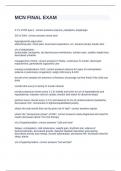MCN FINAL EXAM
3 P's of DM type 1 correct answers polyuria, polydipsia, polyphagia
S/S of DKA correct answers onset slow
hyperglycemia signs plus:
abdominal pain, chest pain, Kussmaul respirations, n/v, acetone (fruity) breath odor
s/s of dehydration:
tachycardia, tachypnea, dry lips/mucous membranes, sunken eyes, sudden weight loss,
decreased urination
management of DKA correct answers IV fluids, continuous IV insulin, electrolyte
replacement, generalized supportive care
nursing considerations: DKA correct answers observe for signs of overhydration
(edema or pulmonary congestion); weigh child every 8-12hr
test all urine samples for presence of ketones; encourage cal-free fluids if the child can
drink
monitor B/S every hr during IV insulin infusion
monitor potassium levels every 1-2 hr initially and looks for s/s of hyperkalemia and
hypokalemia; maintain child on cardiac monitor and watch for abnormal beats
perform neuro checks every 1-2 hr and observe for s/s of cerebral edema (headache,
decreased LOC, nonreactive to light/unequal/dilated pupils)
what's the only insulin that can be given via IV drip? correct answers regular
what's the "honeymoon phase" of DM? correct answers newly diagnosed and need for
insulin decreases about 7mo into therapy
s/s of hypothyroidism correct answers "cold and slow"
fatigue, constipation, cold intolerance, weight gain, dry/thick skin, edema of
face/eyes/hands, decreased growth, delayed skeletal maturation and puberty,
decreased activity and energy, muscle hypertrophy, decreased HR, increased need for
sleep, ataxia
s/s of hyperthyroidism correct answers "hot and fast"
, emotional lability, anxiety, diarrhea, heat intolerance, weight loss, increased appetite,
smooth/velvety skin, prominent eyes, accelerated linear growth, hyperactivity, muscle
weakness, increased HR, high BP, tremors
s/s of diabetes insipidus correct answers increased urination (polyuria), nocturia,
increased thirst (polydipsia), dehydration, hypernatremia, urine specific gravity <1.005
s/s of SIADH correct answers decreased urination, hypertension, weight gain, fluid
retention, hyponatremia, urine specific gravity >1.030
s/s of hyponatremia correct answers mild/early - anorexia, nausea, headache, vomiting
moderate - confusion, lethargy, irritability, altered LOC
severe - seizures, coma
s/s of hypoglycemia correct answers rapid onset
adrenergic s/s: trembling, sweating, tachycardia, pallor, clammy skin
personality change, irritability, drunken behavior, slurred speech, decreased LOC to
total loss of consciousness, seizure activity
s/s of hyperglycemia correct answers slow onset
increased urination, increased thirst, fatigue, weight loss (gradual, over several weeks),
blurred vision
emotional lability, headache, hunger
causes of hypo- vs. hyperglycemia correct answers hypo - too much insulin, excessive
activity without eating extra carbs, missed or delayed meal
hyper - excessive intake of carbs, little or no exercise, inadequate amount of insulin,
increased stress (either emotional or physical)
treatment of hypoglycemia correct answers 15g of carb
for loss of consciousness or seizure activity: glucagon SQ or IM; IV dextrose
treatment of hyperglycemia correct answers insulin; exercise; increased oral fluids
when does precocious puberty become evident? correct answers onset of puberty
before 8years of age in girls and before 9years of age in boys




